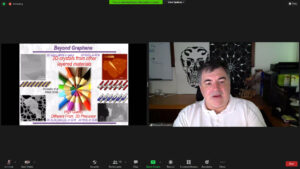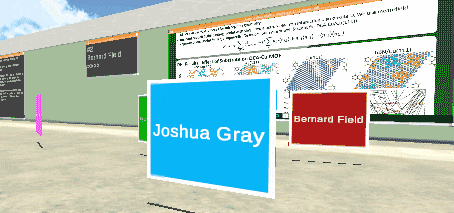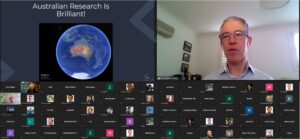
The new iSee virtual meeting platform provided the opportunity for more natural interaction with peers
With strict Covid-19 restrictions across much of FLEET’s Australian nodes, and eliminating international visitors, the decision was made to hold the Centre’s 2020 annual workshop entirely online.
By this time, Centre decision-makers were well aware of ‘Zoom fatigue’. People spending many hours on Zoom each week were finding interacting only via computer screen to be dis-engaging, and surprisingly exhausting.
In response, FLEET’s annual workshop alternated between morning sessions conducted in the now-traditional Zoom format, with extended breaks for recharge between talks, and afternoon poster sessions on the new iSee virtual-meeting platform.

An advantage of the online format was the ability to invite international guest speakers, such as Nobel Physics laureate Prof Kostya Novoselov dialling in from Singapore
“While Zoom works well for ‘formal’ plenaries and webinar talks, it has its limits,” says Communications Committee Chair Dr David Cortie. “We found the new iSee platform to be ideal for poster sessions and informal meetings, allowing spontaneous, ‘organic’ conversations and break-out rooms in a virtual environment, which can be engaging and refreshing.”
The new, Australian-developed iSee platform uses a gaming-graphics engine to create a 3D virtual environment of a conference venue, or lecture theatre, allowing participants to move around and reinforcing ‘normal’ interactions through realistic spatial audio (i.e. people standing further away are quieter), supporting multiple conversations in the same space.
This is done while maintaining the face-to-face ‘webcam’ screenshot of participants familiar from Zoom.

The iSee virtual platform worked particularly well in allowing ‘fluid’ interactions in poster sessions, with participants moving easily from poster to poster, and engaging properly with each presenter
In addition, iSee provides the ability to set up virtual spaces, complete with posters and PowerPoint presentations.
iSee has its origins in the Smart Services Cooperative Research Centre which was jointly funded by industry and the Australian Government.
“Adopting the iSee platform for our meetings was an ambitious goal,” says David Cortie. “We knew the unfamiliar navigation of a virtual platform could trouble some members, particularly anyone unfamiliar with ‘first person’ type computer gaming.”
“But we felt that the pros outweighed the cons, and by investing time in this emerging platform, we are helping support a new way to communicate online in the future.”
“We used a hybrid combination of Zoom for the main talks, and iSee for the poster sessions and social events at our annual meeting.”
Despite technical challenges, and navigating the (previously unknown!) phenomenon of virtual motion sickness for some members, FLEET was satisfied with the iSee experiment.
“We should be pushing the envelope of communications to some degree,” explains David. “iSee, Slack, and the regular weekly tearoom were all examples of new communications initiatives that we trialled to see what worked and what didn’t.”
The annual workshop included:
- Tutorials by FLEET partners and advisers on 2D materials, exciton-polaritons and quantum metrics
- An introduction to research translation
- Why sustainable future computing counts: the contribution of AI and data science to society’s wellbeing
- Introduction to better modelling of equity initiatives in STEM
- Research updates presented by ECR theme representatives
- Virtual poster sessions each day in iSee, with 10 posters presented each day
- Social activities in iSee: trivia and FLEET quiz
- Plenty of opportunities and spaces for networking and small group discussions.

Lisa Kewley of the ARC ASTRO3D
Centre shared her work on data-based modelling of STEMM gender equity in Australia, and proven effective initiatives

FLEET Advisor Joanna Batstone (Monash Data Futures Institute) reminded us why computing must continue to grow, unthrottled by energy costs, with a talk on medical/societal benefits from machine learning, artificial intelligence

JQI’s William Phillips (Nobel Prize 1997) gave an engaging talk on the recent quantum reform of the metric system
—an extract from the 2020 FLEET annual report



